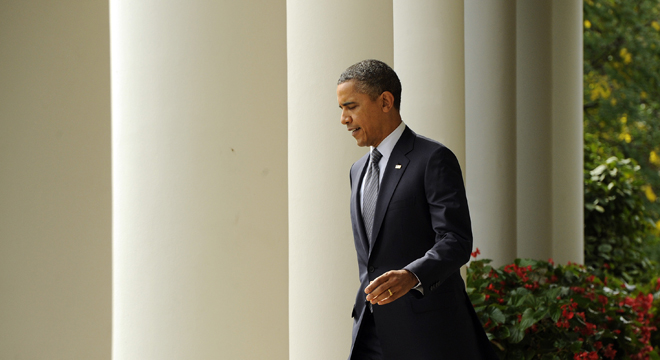Hey, he had to do something.
Coming up on three years as President, the unemployment rate remains stubbornly high, and the American public is fretting about a double-dip recession. Its taken a real toll on President Obama’s economic approval rating, which has been locked in the mid to low thirties: the TPM Poll Average is at 33.6 percent approval versus 60.7 percent disapproval, down from slightly higher approval earlier in the year.
The post-summer solution? Pivot to the issue voters care about the most — jobs.
The President introduced his jobs plan in a speech 12 days ago, and followed up with a deficit reduction package and the “Buffett rule,” a proposal that carries both a well-respected name and a tax on millionaires — something voters are supportive of. The media has followed the President’s lead, as the jobs issue has taken up the much of the ink and cable TV time over the last weeks. For the moment, everyone is talking about how to create more jobs, an issue Republicans also said they wanted to turn to. But the Buffett rule has made the GOP play immediate defense by trotting out the “class warfare” charge, reserved for those moments when populist arguments bump up against the business friendly core of the Republican Party. The President responded with a viral quote in an address on Monday: “It’s not class warfare, it’s math.”
So will a change of subject lead to a boost in the President’s economic numbers ahead of the 2012 season?
The jobs plan the President has touted is on solid ground in the polls: Gallup showed that a 45 percent plurality of Americans support it, as did a 43 percent plurality in a recent CNN/ORC survey. Within that jobs plan there are popular individual proposals — a CBS/New York Times poll on Friday showed majorities supported all the components tested. It has the feeling of a brick-by-brick strategy: the President can build his standing on the economy by singling out issues that are popular on their own.
But it’s still not a substitute for a recovery. In an email to TPM, one senior Democratic strategist said that there are really two components of a president’s economic rating. There’s the action a chief executive takes, and there’s how people are feeling. So even if Obama pulls out all the stops on job creation, it may not help his approval much unless there’s a tangible increase in voters’ disposable income or the unemployment rate goes down. In that case, you make the election about a choice. As in, who’s got better ideas for the economy? “Obama has retaken the reins of the debate outside Washington and shown he’s on the side of middle class voters,” the strategist said. “But now its up to Republicans to do something besides say ‘No.'”
The pivot has come at time when the numbers are particularly grim for the President. In the latest CBS/New York Times poll, the survey asked “Has Obama Made Progress Fixing the Economy?” to which only 25 percent said yes against 68 percent, reflecting the general economic pessimism that overtaken the county. But as TPM and others have noted, dissatisfaction with all those in Washington spiked after the almost-default and subsequent debt downgrade, a redux of which is brewing in Congress right now. The concentration on jobs also allows the President to capture ground on the issue most voters worry about while creating some much needed space from the Super Committee, confining the pit of despair that is the deficit issue.
In grasping the jobs mantle, Obama essentially goes bigger than the committee, the strategist said. The President can keep them from dictating the agenda of the economy and help maintain press coverage on jobs, something that many pundits came to criticize about the legislative strategy over health care reform. In that situation Obama left the details to Congress, creating a massive sausage-making spectacle. On the jobs plan he may be late to the table, but he’s brought specifics, with both the proposals and how he’d like to pay fo them.
It’s a way to take the lead on the big issue while calling into question the GOP’s role in the debt fight, which made voters extremely sour. “Washington Republicans couldn’t get their act together on the debt limit, haven’t matched him on jobs and now have to match him on deficit reduction,” said the Dem strategist. “That’s a lot of points to spot an incumbent President.”
Get the day’s best political analysis, news and reporting from the TPM team delivered to your inbox every day with DayBreaker. Sign up here, it takes just a few seconds.









